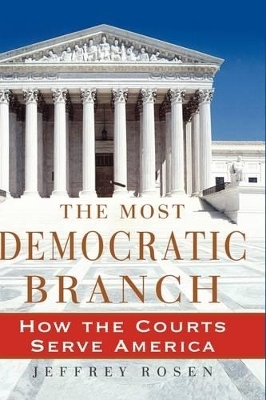
The Most Democratic Branch
How the Courts Serve America
Seiten
2006
Oxford University Press Inc (Verlag)
978-0-19-517443-4 (ISBN)
Oxford University Press Inc (Verlag)
978-0-19-517443-4 (ISBN)
Many critics attack federal judges as activists out of step with the mainstream of American thought. Others argue that judges should place principle before the views of the people. This book disagrees with both assertions, stating that contrary to what interest groups claim, the federal courts by and large reflect the opinions of the mainstream.
Many critics attack federal judges as anti-democratic elitists, activists out of step with the mainstream of American thought. But others argue that judges should stand alone as the ultimate guardians of American values, placing principle before the views of the people.
In The Most Democratic Branch, Jeffrey Rosen disagrees with both assertions. Contrary to what interest groups may claim, he contends that, from the days of John Marshall right up to the present, the federal courts by and large have reflected the opinions of the mainstream. More important, he argues that the Supreme Court is most successful when it defers to the constitutional views of the American people, as represented most notably by Congress and the Presidency. And on the rare occasion when they departed from the consensus, the result has often been a disaster.
To illustrate, Rosen provides a penetrating look at some of the most important Supreme Court cases in American history--cases involving racial equality, affirmative action, abortion, gay rights and gay marriage, the right to die, electoral disputes, and civil liberties in wartime. Rosen shows that the most notorious constitutional decisions in American history--the ones that have been most strenuously criticized, such as Dred Scott or Roe v. Wade--have gone against mainstream opinion. By contrast, the most successful decisions--from Marbury v. Madison to Brown v. Board of Education--have avoided imposing constitutional principles over the wishes of the people. Rosen concludes that the judiciary works best when it identifies the constitutional principles accepted by a majority of Americans, and enforces them unequivocally as fundamental law.
Jeffrey Rosen is one of the most respected legal experts writing today, a regular contributor to The New York Times Magazine and the Legal Affairs Editor of The New Republic. The provocative arguments that he puts forth here are bound to fuel heated debate at a time when the federal judiciary is already the focus of fierce criticism.
Many critics attack federal judges as anti-democratic elitists, activists out of step with the mainstream of American thought. But others argue that judges should stand alone as the ultimate guardians of American values, placing principle before the views of the people.
In The Most Democratic Branch, Jeffrey Rosen disagrees with both assertions. Contrary to what interest groups may claim, he contends that, from the days of John Marshall right up to the present, the federal courts by and large have reflected the opinions of the mainstream. More important, he argues that the Supreme Court is most successful when it defers to the constitutional views of the American people, as represented most notably by Congress and the Presidency. And on the rare occasion when they departed from the consensus, the result has often been a disaster.
To illustrate, Rosen provides a penetrating look at some of the most important Supreme Court cases in American history--cases involving racial equality, affirmative action, abortion, gay rights and gay marriage, the right to die, electoral disputes, and civil liberties in wartime. Rosen shows that the most notorious constitutional decisions in American history--the ones that have been most strenuously criticized, such as Dred Scott or Roe v. Wade--have gone against mainstream opinion. By contrast, the most successful decisions--from Marbury v. Madison to Brown v. Board of Education--have avoided imposing constitutional principles over the wishes of the people. Rosen concludes that the judiciary works best when it identifies the constitutional principles accepted by a majority of Americans, and enforces them unequivocally as fundamental law.
Jeffrey Rosen is one of the most respected legal experts writing today, a regular contributor to The New York Times Magazine and the Legal Affairs Editor of The New Republic. The provocative arguments that he puts forth here are bound to fuel heated debate at a time when the federal judiciary is already the focus of fierce criticism.
Jeffrey Rosen is Professor of Law at George Washington University. Named by The Chicago Tribune as one of the best magazine journalists in America, he is the author of The Unwanted Gaze and The Naked Crowd, and his essays and commentaries have appeared in The New York Times Magazine, The Atlantic Monthly, The New Yorker, and The New Republic, where he is the Legal Affairs Editor.
Acknowledgments
Preface
Introduction: The Most Democratic Branch
Chapter 1: Cautionary Tales
Chapter 2: Race
Chapter 3: Love and Death
Chapter 4: Politics
Chapter 5: Civil Liberties
Epilogue: Constitutional Futurology, or What are Courts Good For?
Notes
Index
| Erscheint lt. Verlag | 1.5.2007 |
|---|---|
| Reihe/Serie | Institutions of American Democracy |
| Verlagsort | New York |
| Sprache | englisch |
| Maße | 153 x 217 mm |
| Gewicht | 413 g |
| Themenwelt | Recht / Steuern ► Allgemeines / Lexika |
| Recht / Steuern ► EU / Internationales Recht | |
| Recht / Steuern ► Privatrecht / Bürgerliches Recht | |
| Sozialwissenschaften ► Politik / Verwaltung ► Politische Systeme | |
| ISBN-10 | 0-19-517443-7 / 0195174437 |
| ISBN-13 | 978-0-19-517443-4 / 9780195174434 |
| Zustand | Neuware |
| Haben Sie eine Frage zum Produkt? |
Mehr entdecken
aus dem Bereich
aus dem Bereich


